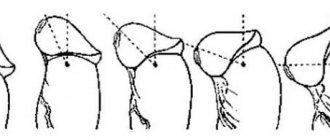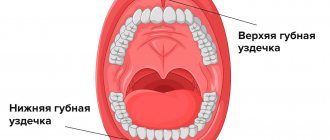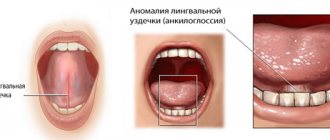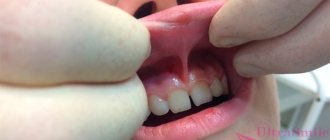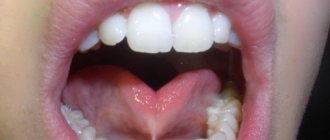What is lingual frenuloplasty?
The frenulum is a small membrane that connects the lower part of the tongue and the mucous membrane of the lower jaw. Despite its small size, it performs very important functions: it is responsible for the formation of dental occlusion, controls the mobility of the tongue and the functioning of the facial muscles.
There are three main pathologies of the tongue frenulum that require surgical correction.
- Wrong shape.
A healthy frenulum is a fold of mucous membrane in the shape of an arc. - Small size
(in medical terminology - ankyloglossia). The average length of the frenulum of the tongue in an adult is 3 centimeters; in a child it is shorter. In the case of ankyloglossia, the frenulum will not allow the tongue to be raised completely upward. - Incorrect mounting location.
A healthy frenulum is attached to the middle of the tongue, and with pathology it can be shifted to the tip.
In some cases, it becomes necessary to perform plastic surgery of the lip frenulum - the fold of mucous membrane connecting the lip and gum. The operation is performed to avoid impaired diction and the formation of malocclusion. Read more about lip frenuloplasty here.
general information
Frenuloplasty is a simple and fairly effective operation that involves cutting the frenulum of the upper lip. It allows you to prevent or solve many problems related to the child’s health. Sometimes this operation is also performed on adults (if an orthodontist or speech therapist recommends it).
The labial frenulums are elastic folds of the oral mucosa that provide support for the lips in the correct position and attach them to the jaw bones and gums. The size of the frenulum and its location are very individual: there are people who have several frenulums, while others do not have any at all. This pathology can provoke malocclusion and periodontal disease. In the case of its normal location, the frenulum of the upper lip is woven into the gum (5-8 mm in the middle of the neck of the tooth), it does not interfere with normal speech, and also does not negatively affect health. When the upper frenulum is woven into the interdental papilla (if it is very short, wide or not elastic enough), various negative consequences are possible. This defect can be corrected by plastic surgery of the frenulum of the upper lip. There are no other methods that will restore health and make a normal frenulum.
Causes of tongue frenulum anomaly
Most children have mild pathology, but severe forms are also not uncommon. The size of a child’s tongue frenulum is most often determined by heredity, as well as the following factors:
- viral infection in the mother in the first and last trimesters;
- late toxicosis;
- exacerbation of chronic diseases during pregnancy;
- injuries in the abdominal area during gestation;
- taking potent drugs by the expectant mother.
Symptoms of a shortened frenulum
How to determine if your baby needs surgery? It is necessary to seek specialist advice. However, you can notice signs of a defect in the frenulum of the tongue yourself by paying attention to some details.
- The frenulum resembles a transparent film and does not have a vascular network.
- The tongue is inactive.
- The child cannot reach the upper palate with the tip of his tongue.
- When you move your tongue, clicks are heard.
- Chewing and swallowing are difficult.
- Diction is broken.
- The lower front teeth are turned towards the tongue.
When and who needs tongue frenuloplasty?
Most often, an abnormality of the frenulum of the tongue can be diagnosed in a child immediately after birth. Then it is recommended to fix it. However, plastic surgery is performed on children of preschool and school age, as well as adults. The operation is indicated in the following cases.
- Violation of sucking in newborns.
If babies have a tongue frenulum that is too short, they cannot latch onto the nipple properly, resulting in underweight, fussiness, and poor sleep. - Diction defects.
Due to poor tongue mobility, children distort some sounds, especially “r”, “l” and hissing sounds. As a rule, the problem is discovered by a speech therapist in preschool age. - Abnormal shape of teeth and gums.
A tongue frenulum that is too short can interfere with proper growth of the lower jaw. This leads to incorrect positioning of the front teeth and gum recession. - Preparation for implantation and prosthetics.
Any deviations in the shape of the soft tissue from the norm can ultimately lead to implant failure, so they need to be corrected before surgery. The discomfort caused by the pathology of the frenulum of the tongue during the use of removable dentures, especially on the lower jaw, is also important: the structures simply fall out when talking or eating.
How the research took place
Forty-one patients with overweight or severe obesity and a diagnosis of severe apnea were selected for analysis. Among them were men and women aged from 40 to 65 years. All of them had undergone uvulopalatoplasty over the past 1-5 years, but then again began to complain of snoring, respiratory arrest, and daytime sleepiness. It is characteristic that less than half of them underwent cardiorespiratory monitoring before surgery. The rest were not examined at all before surgery.
The patients were conditionally divided into groups.
| Group No. 1 | Group No. 2 |
|
|
Patients in group 2 were initially offered intraoral mouth guards or CPAP. However, for various reasons, they refused treatment and went to other clinics, where they underwent uvulopalatoplasty. Patients from the first group probably did not even suspect the existence of an alternative, because... immediately contacted an otolaryngologist.
- Group No. 1.
In all participants, cardiorespiratory monitoring confirmed severe sleep apnea. The patients suffered from excessive daytime sleepiness: four of them had cases of sudden falling asleep while driving, seven at work, and three while eating. The questionnaire revealed a low quality of night's rest with multiple awakenings, nightmares and difficulty getting up in the morning. In 18 of 22 patients, a scar deformation was found in the oropharynx, which reduced the lumen of the pharynx, that is, in fact, the goal of increasing the lumen of the airways was not achieved. - Group No. 2.
Thanks to the preoperative examination of these patients, the researchers were able to assess the dynamics of the condition of the upper respiratory tract. Uvulopalatoplasty did slightly reduce the average apnea-hypopnea index for the group. However, in not a single patient did this indicator reach the target value corresponding to the concept of health. Moreover, in 9 out of 19 people, the apnea-hypopnea index, on the contrary, increased. The surgical procedure did not affect the quality of sleep and daytime sleepiness; they remained unchanged. In most patients, cicatricial deformation of the soft palate was observed.
After the examination, patients from both groups were offered conservative methods of snoring correction. Eighteen men and women began CPAP therapy, and an additional 11 agreed to use custom mouth guards. In all those who continued treatment with conservative methods, daytime sleepiness significantly decreased and the quality of night rest increased.
What happens if tongue frenuloplasty is not performed in children?
An abnormality of the frenulum of the tongue in children provokes the following serious consequences.
- Due to a violation of the sucking regime in infancy, the child may not receive enough nutrition and, as a result, lag behind in development.
- Children with tongue frenulum abnormalities may never learn to pronounce some sounds.
- Incorrect placement of the frenulum leads to underdevelopment of the lower jaw, resulting in the formation of an incorrect bite.
If pathology of the frenulum of the tongue has been identified in a newborn, it can be easily corrected by making an incision with a laser. At this age, you won't even need stitches. With age, the structure of the frenulum becomes more complex, new vessels appear in it, so plastic surgery of the frenulum in preschool and school-age children turns into a full-fledged surgical operation. Therefore, it is best to do it at the age of 5-6 years, when the child’s milk teeth are replaced by permanent ones.
Parents can determine whether their child needs surgery on their own. To do this, ask him to reach the upper palate with the tip of his tongue. If he cannot do this, or it hurts, he should consult a doctor.
Indications for surgery
Some pediatricians believe that a short frenulum of the upper lip is not an indication for emergency plastic surgery. But the indications for surgical intervention on the labial frenulum are determined not by a pediatrician or a dental surgeon, but by specialists of narrower profiles - a neonatologist, periodontist, orthodontist or speech therapist.
Often, a neonatologist pays attention to a problem with the frenulum in a newborn if this anomaly affects proper breastfeeding, because the baby’s upper lip is actively involved in this process. In this case, the doctor very often trims the frenulum of the upper lip on his own or may refer the child to a pediatric dentist-surgeon.
A short frenulum of the upper lip can be noticed by speech therapists if the baby’s clear speech functions are impaired and it is difficult to pronounce certain sounds that require the active participation of the lips, for example, “u”, “o” and others. Most often this happens in children after the age of five. In such a situation, conventional cutting is not enough; the patient needs a more complex operation.
Periodontologists and orthodontists most often refer children or adult patients for plastic surgery of the upper lip of a child or adult patient, since an incorrectly attached lip frenulum creates numerous negative consequences for the dental bite and periodontium. If plastic surgery of the upper lip frenulum is not carried out in a timely manner, this may lead to the need for lengthy and expensive orthodontic treatment in the future.
Operation techniques
There are two methods of performing tongue frenuloplasty: traditional (classical) and laser. This is a more modern and safer method. The laser allows the operation to be performed with great precision and does not cause bleeding after the procedure. In addition, there is no need for stitches, and healing time is significantly reduced. This is especially important if you need to perform laser frenuloplasty on a child: the baby will tolerate the procedure much easier.
Depending on what pathology of the frenulum is detected, the doctor uses one of three techniques: cuts the frenulum, removes it, or changes the attachment site. The number of cuts and their shape depend on the choice of technique.
Therapeutic exercises
There are alternative methods that allow you to do without surgery, for example, a set of special exercises for developing the frenulum of the tongue.
- Reach alternately to the upper and lower lips.
- Extend your tongue and make pendulum movements from cheek to cheek.
- Suck your tongue to the roof of your mouth and let go, imitating a horse clopping its hooves.
- Place your tongue on each cheek with your mouth closed.
- Smile with your mouth open.
- Stretch your lips.
- Pull your lips into a tube, pretending to kiss.
To achieve results, you need to perform the exercises every day for 5 - 10 minutes. It is important to remember that this method is suitable for correcting mild disorders; more severe pathologies require surgical intervention.
Results and conclusions
Using the example of group No. 2, it becomes clear that uvulopalatoplasty cannot be used to treat severe obstructive apnea. The operation only in some cases reduced the number of respiratory arrests. But these changes were so small that they did not improve the quality of night's rest or the level of daytime sleepiness. Patients in group 1 also did not achieve the target AHI level.
In addition, scientists have found evidence that uvulopalatoplasty may worsen nocturnal breathing problems due to scarring of the tissue of the soft palate. And this often leads to the opposite effect, i.e. increased snoring.
Finally, 29 patients who agreed to CPAP therapy or the use of custom mouth guards were provided with adequate night breathing, despite the deformation of the soft palate acquired after uvulopalatoplasty. In fact, such non-surgical treatment should have been initiated in them initially, instead of surgical intervention.
Price for plastic frenulum of the tongue
The cost of this procedure usually consists of the cost of consultation and examination, local anesthesia and the service itself. This is a fairly simple surgical procedure, so no additional tests are required. The price of a classic operation (with a scalpel) for adults and children is the same, but may be slightly higher if the patient has too dense frenulum tissue. Then they do not give local anesthesia, but general anesthesia; it costs more, and, accordingly, costs increase due to this. The average cost of classic lingual frenuloplasty in Moscow is 3,800 rubles. The price for laser plastic surgery of the frenulum of the tongue is about 5,000 rubles.

